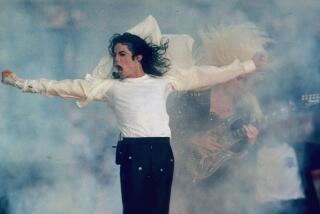Why Isn’t This Man’s Album Selling? : Maybe It’s Because George Michael Has Taken Himself Out of the Picture
When his “Listen Without Prejudice, Vol. 1” album was released in September, George Michael said he was willing to sacrifice record sales for artistry.
The public seems to be helping him out. Based on the sluggish, early retail performance of the album, pop fans aren’t rushing to the stores at the pace set by Michael’s last album, 1987’s Grammy-winning “Faith.”
For the record:
12:00 a.m. Nov. 14, 1990 For the Record
Los Angeles Times Wednesday November 14, 1990 Home Edition Calendar Part F Page 6 Column 1 Entertainment Desk 1 inches; 22 words Type of Material: Correction
Wrong date--The photograph of George Michael in Monday’s Calendar was taken at his October, 1988, Forum concert. The incorrect date was given in the caption.
Many record industry observers are closely following the album’s progress, wondering if the relatively disappointing sales are due to the British singer’s much-publicized refusal to participate in such proven promotional devices as appearing in videos and going on an extensive tour.
“When we first heard there would be a new George Michael album, we felt it would be one of the two or three biggest records through the holidays,” said Chuck Lee, director of music buying for the 278-store Wherehouse chain in Los Angeles.
“But it’s disappointing. We think it will do well, but no, it’s not going to be a Top 5 record (this holiday season) and you have to say that if George Michael had done a really pop record and videos, it could have done better. So it’s hurting.”
The reference to “pop record” and video points to the larger questions now being explored by other artists and executives in the pop world.
To some industry observers, Michael’s decision to downplay his celebrity at the same time he is trying to write more personal, introspective songs represents a bold experiment by a recording star trying to be taken seriously after years as a teen and media sensation.
Though the promotion campaign for “Faith” depended heavily on Michael’s sexy image in videos, the British singer-songwriter decided this time not to appear in videos for the album. He also did only a limited number of interviews and decided not to go out immediately on tour in support of the album.
In announcing his decision, Michael--echoing the complaints of numerous artists since the rise of MTV in the early ‘80s--argued that videos destroy the artistic integrity of a song by encouraging listeners to accept a single interpretation of the song. He also said long tours have a dehumanizing effect that works against both the creative process and a healthy personal life.
The experiment will be closely monitored in the record industry. If Michael can maintain acceptable sales with his low-key approach, other artists may feel free to break away from videos and touring. If not, videos and touring will continue to be seen as essential to maximizing sales.
Though the album’s first single, “Praying for Time,” was played by a record number of stations during its first week of release and went to No. 1 in Billboard six weeks ago, the album itself peaked at No. 2 that same week and has dropped slowly, but steadily.
Last week it slipped from No. 8 to No. 10. By contrast, “Faith” stayed at or near the top of the charts through the winter of ‘87, holding the No. 1 position for a total of 12 weeks.
Radio, too, has noticed a cooling of its audience toward Michael. “His stuff is selling and there are requests for it,” said KIIS-FM program director Bill Richards. “But it’s not the gargantuan, huge numbers that there were on the phenomenon last time. He’s an important core artist to our format, but not the happeningest, hippest one now. . . . It probably hurts that he’s not doing videos.”
But both Richards and Lee said they respected Michael for taking his stand, suggesting that even with full promotion, “Listen” may have been hard pressed to generate as much sales and interest as “Faith.”
“A lot of this has to do with the fact that he was so big last time that it’s hard to repeat that success,” Richards said, noting Michael Jackson’s inability to make “Bad” as big a seller as “Thriller,” the all-time top-selling album.
And comparisons are a little unfair, some industry observers say, since the public appetite for “Faith” was primed by two big hit singles, “I Want Your Sex” and “Faith,” that came out before the album was released. In fact, the “Faith” single was No. 1 the week the album hit the stores.
Actually, videos are being done for Michael’s singles from the new album, but he’s not appearing in them. The latest, “Freedom ‘90,” is a splashy effort by stylish video director David Fincher, using five fashion models for a sexy approach reminiscent of the videos for “I Want Your Sex” and “Faith.”
The new video is a stark contrast to the one released for “Praying for Time.” Done with only reluctant approval by Michael, that was a record-company-produced clip that merely featured the lyrics for the song against a murky background.
“The (‘Freedom ‘90’) video could render this topic obsolete,” said Michael’s publicist, Mitchell Schneider, who feels the impact of the video may help the album move back up the charts.
But one veteran industry observer, who asked not to be identified, is doubtful that a new push will help much. “Once an album is tainted as less than a blockbuster it’s hard to turn it around,” he said. “Better to wait until the next album.”
That now seems to be just what Michael is doing. Plans for a charity mini-tour early next year have been scrapped in favor of a major arena tour later in the year, after the release of “Listen Without Prejudice Vol. 2,” which Michael is working on now. The seven benefit shows will be incorporated into that tour.
Are the release of a sexy video and the change of tour plans a retreat from the experiment brought on by the slowed sales? At least one prominent manager thinks so.
“The whole thing seems contrived to me,” said the manager, who asked not to be identified. “Somewhere inside him he does have the desire to be taken seriously, but in the course of time the music speaks for itself and he doesn’t have to say, ‘I’m not doing this’ or ‘I’m not doing that’ and ‘I’m not going to be in the video.’
“Too much noise is being made about this, when you can only be like that if it happens naturally.”
But publicist Schneider says that attitude comes from a misconception.
“Some people think George doesn’t want to be visible,” he said. “That’s not correct. Like any artist, he does want to be seen. But he was concentrating on songwriting. Meanwhile, he did media including the New York Times, the Los Angeles Times and USA Today. . . . But (he’s) communicating the essence of the record, and with this there’s been a shift of focus (from the past).”
And Rob Kahane, Michael’s manager, dismisses the cynics.
“With George it may seem contrived but it’s not,” he said. “He’s concerned with doing what makes him feel good about himself and making music he wants to. . . . Too many people are shortsighted as to what makes a career. He’s 27 and has the ability to make the music he wants and hopefully people will buy it.
“Many other major artists are burning out. The only way he can continue to make great music is to stop selling so hard, and he’s willing to do what it takes. . . . We’re looking at having this artist writing great music for a long time to come.”
The consensus among industry observers is that the experiment is justified, and that results cannot be measured in terms of record sales.
“It always comes down to the music,” said Los Angeles-based artist manager Ron Weisner, whose clients have included Michael Jackson, Paul McCartney and Steve Winwood. “I respect him for taking that stand, and he can afford to (take it) because he’s a powerful songwriter. But is this a wrong move or a right move? Only time will tell. I hope it’s right. . . . Major artists have to be careful of overkill.”
And Bob Merlis, Warner Bros. Records vice president of press and publicity, agreed. Asked how he would advise one of his artists if he or she expressed a desire to follow the same strategy, he replied: “If you’re coming off an album that sold 14 million, I say, ‘God bless you.’ If you’ve achieved that sales base, you have every right to call the shots.”
More to Read
The biggest entertainment stories
Get our big stories about Hollywood, film, television, music, arts, culture and more right in your inbox as soon as they publish.
You may occasionally receive promotional content from the Los Angeles Times.








